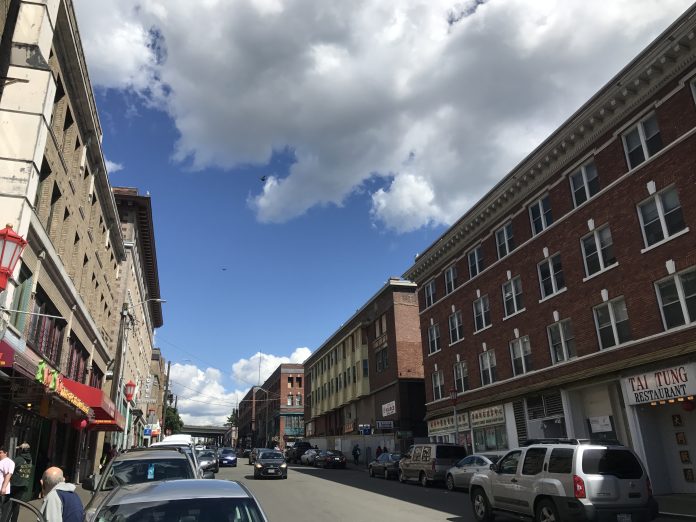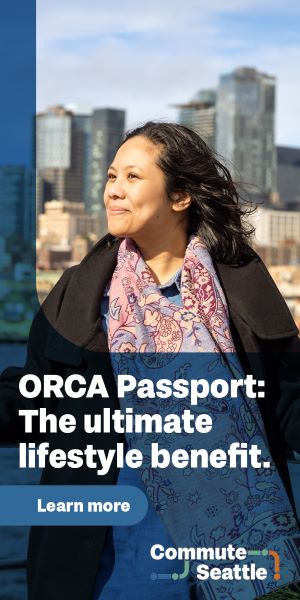A package of rezones are headed to the Chinatown-International District area in a few short weeks. The rezones promise to unlock Mandatory Housing Affordability (MHA) requirements in areas with increased development capacity changes. Before that happens though, the Seattle City Council’s Planning, Land Use, and Zoning (PLUZ) Committee will consider amendments to the rezone proposal. The first batch of amendments will be discussed today and include:
- Expanding the International Special Review District to match the full bounds of Chinatown-International District and the rezone area;
- Revising the boundaries of the local Design Review Boards so that the Downtown Design Review Board covers the full extent of the rezone area;
- Exempting large affordable housing projects from incentive zoning requirements in certain zones; and
- Considering amendments to help locally-owned, small businesses.
In addition, the PLUZ Committee will consider the option of adopting a corresponding resolution outlining specific objectives and processes occur after the rezones are enacted.
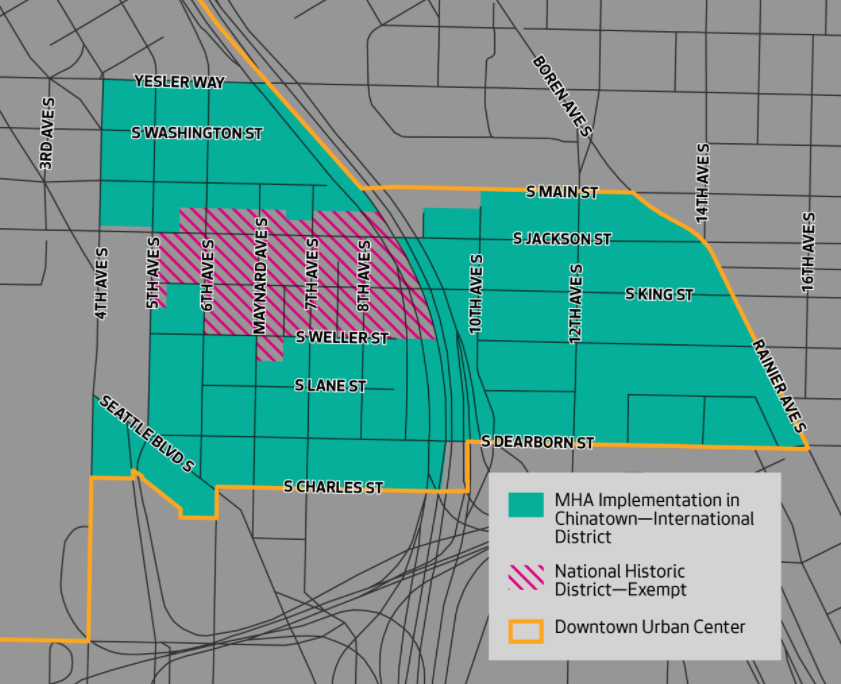
Summary of the Amendments
The International Special Review District (ISRD) is was established to deal with development within the Chinatown-International District since it is one of Seattle’s eight historic districts. The ISRD is responsible for reviewing and conditioning a wide variety different development activities, including: interior changes to buildings that affect their exterior; any new addition, construction, or remodel of a structure; any newly proposed business or service; any changes in the public right-of-way or other public spaces, such as parks and sidewalks; any demolition of a building or structure; or any painting of building exterior within the district boundaries.
Currently, the ISRD boundaries extend to 12th Ave S, but the proposed amendment would extend the boundaries north of S Jackson St to abut Yesler Terrace between I-5 and Rainier Ave S. The proposed amendment would also extend the boundary east of 12th Ave S to Rainier Ave S.
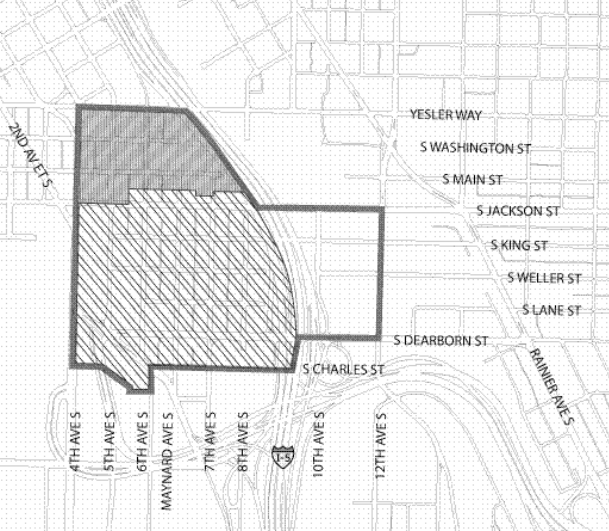
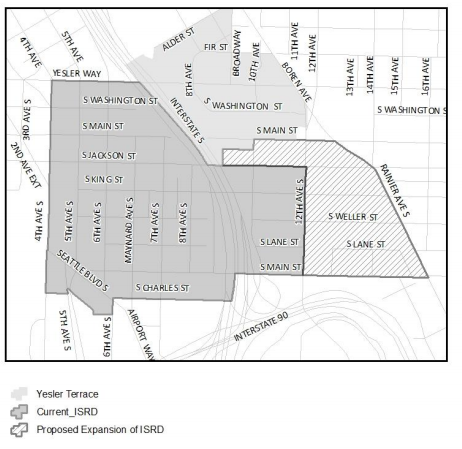
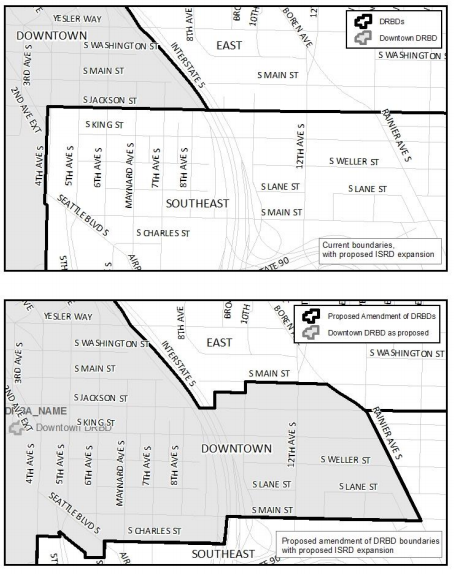
Separately, another amendment is proposed to modify the design review board boundaries so that Downtown Design Review Board will fully take in Chinatown-International District. This means that the East Design Review Board and Southeast Design Review Boards would transfer small pockets of their review jurisdiction to Downtown Design Review Board. Design guidelines applicable to Downtown should generally prevail under the rezone.
A third amendment is designed to allow large voluntary affordable housing projects in the Chinatown-International District to be exempt from mandatory participation in incentive zoning programs for any additional floor area above the base maximum allowed in the DMC, DMR, IDM, and IDR zones of South Downtown. In zones where the maximum building height is limited to or less than 95 feet, all of the additional floor area must be achieved by providing affordable housing. For zones where the maximum building height is above 95 feet, at least 60% of the additional floor area must be achieved by providing affordable housing. Another 40% of the additional floor area must be achieved by preserving historic landmarks and open space through purchase of transfer of development rights, developing on-site privately-owned public spaces (e.g., public open space, public atriums, human services uses, and public restrooms), or constructing local Neighborhood Green Street improvements.
To qualify for the proposed exemption under the draft amendment, a development would have to:
- Receive public funding or Low-Income Housing Tax Credits from the federal government;
- Have a minimum of 40% of all units income-restricted to households making at or below 60% of the area median income; and
- Serve as affordable housing for at least 40 years either by covenant or other recorded property agreement with a local, state, or federal agency.
These kinds of large voluntary affordable housing projects are also already exempt from the MHA requirements (see SMC 23.58C.025.C) because they greatly exceed the affordable housing requirements built into the MHA program. Ultimately, the exemption and proposed exemption serve to encourage large voluntary affordable housing projects to be built by removing additional development requirements that could affect project financing.
A fourth amendment topic related to locally-owned, small businesses could be discussed. A specific set of amendments have not been drafted, but Council Central Staff indicates that new regulations could “work in concert with other [Chinatown-International District] land use regulations, especially those in the ISRD, to help create and sustain space for small businesses.”
Draft Companion Resolution
In addition to the four amendments, the PLUZ Committee will consider a companion resolution that addresses a variety of actions related to the neighborhood rezone. These include the following:
- Committing the City to consider the issue of displacement in informing decisions to make investments (could result in use of the Equitable Development Initiative);
- Requesting that departments coordinate their planning and project efforts directly with neighborhood organizations;
- Recognizing the important cultural, historic, and religious significance of the neighborhood and committing to continue efforts to foster the longevity of those attributes;
- Requesting a report from the mayor on the sequencing and timing of transportation investments (e.g., street design plans, crosswalks upgrades, protected bike lanes, neighborhood greenway, and Center City Connector project) within the neighborhood;
- Recognizing that multicultural, multilingual, and elderly public services and businesses must be cultivated within the neighborhood;
- Requesting a report from the mayor on the sequencing and timing of parks and public space investments (e.g., park enhancements, green streets, mid-block crossings, and pocket parks) within the neighborhood and committing to support ongoing operation and maintenance of public space;
- Requesting that departments continue public safety efforts in the spirit of past recommendations and strive to achieve goals of the Public Safety Action Plan;
- Partnering with local business, community groups, and local patrons to achieve recommendations by the Commercial Affordability Task Force; and
- Committing to updating rules related to local design review.
Next Steps
The PLUZ Committee will only hold discussion on the proposals and amendments today. The PLUZ Committee still must hold a public hearing and vote on referring the legislation to the full council before it would be passed. A final proposal is expected to be approved sometime this summer.
First Look: City Keys Up 5% To 7% MHA For Chinatown-International District Rezone
Central Staff Memo With Proposed Amendments (051617)
Stephen is a professional urban planner in Puget Sound with a passion for sustainable, livable, and diverse cities. He is especially interested in how policies, regulations, and programs can promote positive outcomes for communities. With stints in great cities like Bellingham and Cork, Stephen currently lives in Seattle. He primarily covers land use and transportation issues and has been with The Urbanist since 2014.


